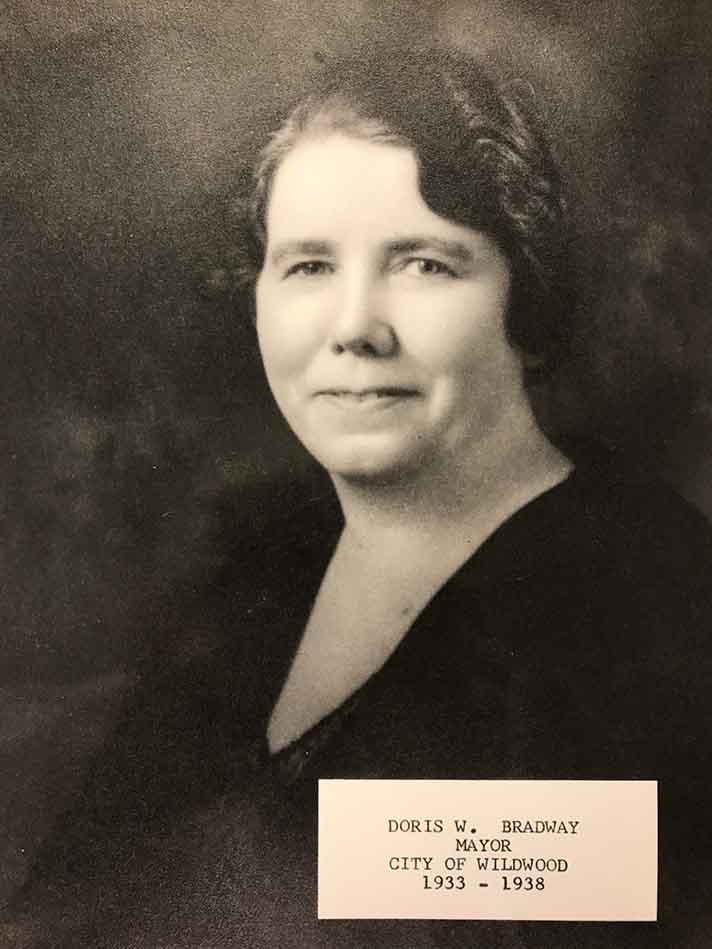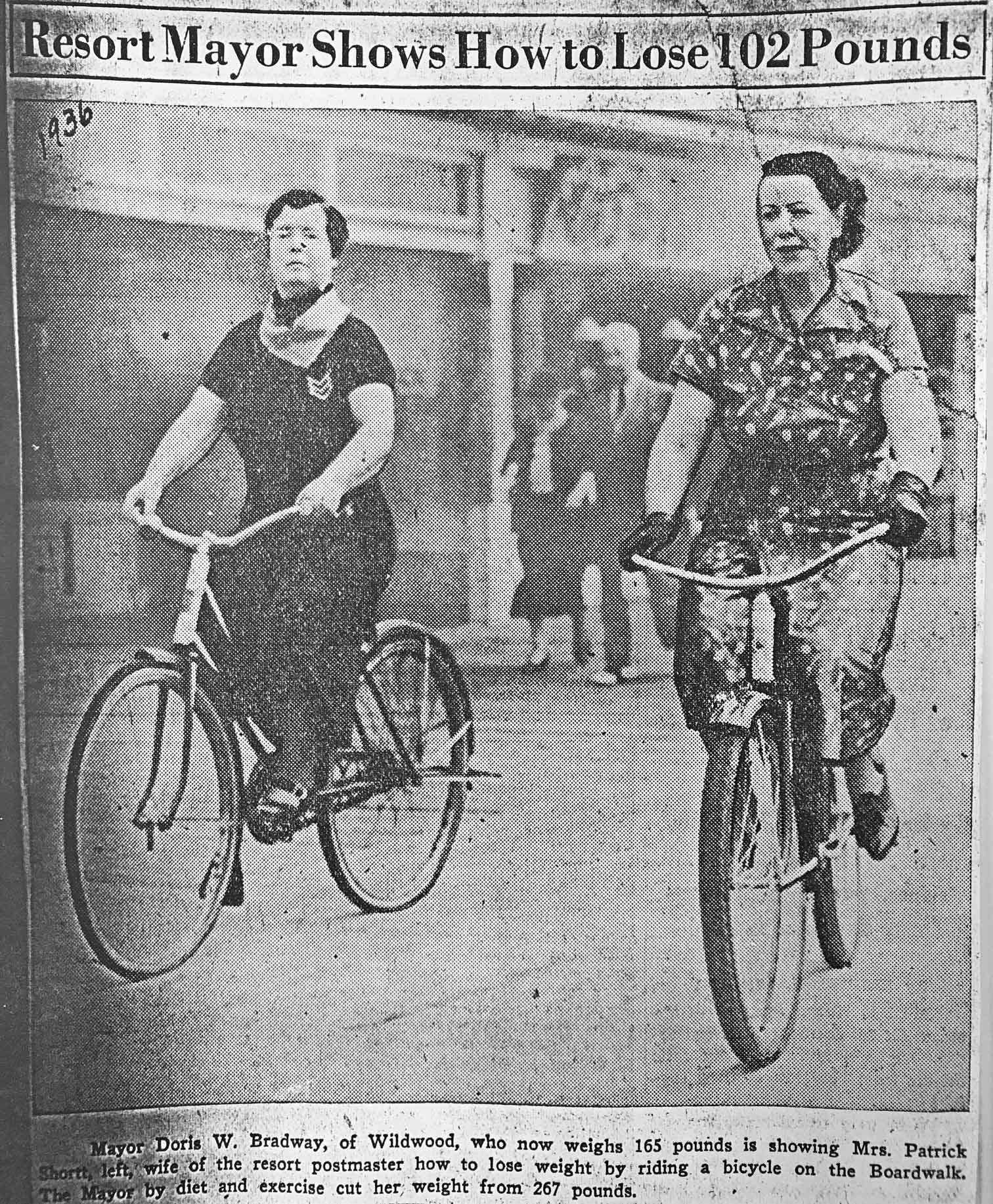

“History is herstory, too.” ~Anon.
by Cathy Tchorni
worldly, separate from rural Cape May County, Wildwood “vibe” during the first half of the 20th century was characteristic of the barrier islands. Hidden, overgrown inlets, allowed liquor to leave the Cape May stills, bound for the cities. Moneyed developers brought knowledge of a wider world from Philadelphia and New York City. Many people transplanted themselves from urban areas to summer cottages and year-around homes in Wildwood.
An example of a newcomer was Doris Bradway. She was born in Elizabeth, NJ, a New York City suburb in 1895, and was educated at Pierce Business College in Philadelphia. She moved to Wildwood in 1919. Her husband, Edwin, worked as a sheet metal contractor. They had two sons, Edwin and Robert.
Her early life seems to have been uneventful. She broke into politics in 1932, becoming Commissioner of Finance for Wildwood after Kenneth Kirbyulen was killed in a car accident. She was appointed mayor when William H. Bright, a friend, died suddenly.
Once she became the Commissioner of Finance she oversaw the Civil Workers Administration (CWA), a job- creation program that was part of President Roosevelt’s New Deal. The CWA did not last long, but Mrs. Bradway brought her concepts learned about the CWA with her into her mayor role. She was the mayor of Wildwood from 1933 to 1938.
She vocally criticized the “old order’s” administration of the CWA. Bradway characterized herself as an “Independent Republican”. Instead of using the CWA funds to assist poverty-stricken residents, she accused the “royal family”—wealthy Republicans who reportedly used the funds for themselves – of “blatant irregularities…using Federal monies for political intrigue and plunder.”
Mrs. Bradway disrupted the traditional world of politics by being a woman in a (then) man’s world. In a newspaper interview (probably 1933) short mention was made of her role as City Commissioner of Finance, yet devoted two long paragraphs to her role as wife and mother. “She determined her home life shall go on just as it did before and that she will shirk no house duties…She does all the work in her 10 room house, keeps it spotless, does her marketing, cooks three hot meals a day for her husband and two sons, does her own baking, washing and ironing…”
She worked in partnership with Edward Zelig (E.J.) Fox, who had arrived with his family from Latvia in 1909, and became committed to beautifying Wildwood with parks. According to an undated transcript from the 1970s, Bradway commented in a transcript of an interview conducted probably in the 1970s, that she had “400 people on relief [in Wildwood during the Depression].” Many homeowners lost them because of non-payment of taxes. Mrs. Bradway helped E.J. Fox acquire defaulted properties, and gave many unemployed men jobs working for the City to create the resulting parks. Bradway and Fox used low land near the bay to build greenhouses, growing shrubs and bright annual flowers to be transplanted to parks as they were created. She also donated flowers to all the churches on Sundays.
Bradway was vocal in that she believed every able-bodied man should work. From the same transcript: “The State would give any city, all of the trees they wanted…understand they’re only little things in a flower pot…now they’re gigantic…it was 40,000 or 50,000 trees… In the meantime we had men…cut down the [old] trees that [were] already there. We had coal and we had wood [to heat houses].” …And the old people who couldn’t cut, and the widows that couldn’t go out there and cut, they got the wood every night, or as many times as they needed it…we supplied city trucks and city men to bring it back.”
“…But I never approved of a relief lines. I don’t approve of it today.” …I wouldn’t put up with that kind of stuff. I had them repair the boardwalk. I had them paint the City buildings.”
Bradway was a determined, forthright, outspoken person. When lifeguards and reporters made fun of her weight, calling her “Big Girl”, she acknowledged that the extra weight prevented her from energetically doing her job. She publicly promised to lose 100 pounds in a year. She did, dropping from 251 to 149. A quote from a newspaper describes her transformation: “Now she has bobbed her hair and wears it becomingly curled around her head. Her eyebrows are thinned and nicely arched.” The paper even published her measurements before and after her weight loss! She was quoted as saying, “How could I be seen in a size 52 bathing suit and then expect the lifeguards to listen to me when I bawled them out?”
During her short, approximately five years in office, Mrs. Bradway made many enemies, none as powerful as William C. Hunt, a Wildwood businessman and politician. As the owner of amusements and movie theaters, he pushed hard to open his businesses on Sundays. Mayor Bradway pushed equally hard and closed his theaters for Sunday. Mr. Hunt promptly sued her for $50,000.
Gradually her enemies outnumbered her supporters. Her personality and actions that had previously been viewed as forthright was now viewed as unfair, unreasonable and illegal. She became unpopular with many of her constituents. Many voters in Wildwood agreed to a special election.
On February 18, 1938 Doris Bradway and City Commissioner, Frederick McMurray were defeated in a recall election in a circus-like atmosphere. Bands played, people milled around the streets. Mrs. Bradley argued that all of Wildwood’s paperwork was at risk and tried to protect it. 3100 of 3500 voters turned out. After the tallies, Bradway had lost by 571 votes, McMurray by 620. She blamed Mayor Frank Hague of Jersey City, a State Democratic czar, saying, “Hague was too much for me today.” She added “I want him [Hague] to live a long enough to regret the day he invaded Wildwood and devoted three years of effort to unseat me…”
Both McMurray and Bradway accepted their defeat, and turned over governance of Wildwood the next day.
Her Wildwood life filled with sensationalism did not end there. Her husband sued for divorce soon after her defeat, saying to the papers that her “affections waned” beginning in 1933. He asked her to leave the house in 1938 and she refused. Her estranged husband allowed the house to fall into foreclosure. Once Doris left the house, he reportedly bought it back.
Divorced in 1939 she ran a confectionary – drug store. Doris and Edwin both remarried, Doris in 1943 to Fred Wood. The second marriage apparently did not last long and Doris took the Bradway name back after a second divorce. Doris lived quietly on 18th Street in North Wildwood, known to nearly every year-around resident. She died in 1982.
